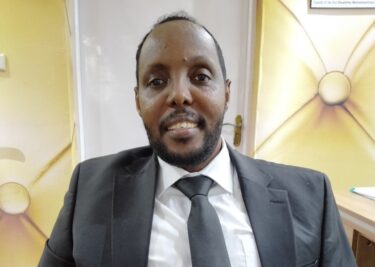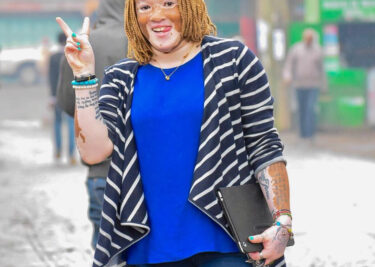The World of Books: A Conversation with Lexa Lubanga
What’s it like to intentionally work towards creating online spaces for readers to celebrate African stories?
Lexa Lubanga speaks with Paukwa’s Cheruto Rono on this, and her personal journey as a propagator of African literature.
Cheruto: How do you describe the work that you do in the literary scene to someone you just met?
Lexa: I am a propagator of our stories. You see, Kenya is a story itself. I always believe so and that everyone has a story to tell. Every day we get to meet different characters or fall into situations that contribute to our stories. I like getting involved in these stories; I love sharing them and continually support those that make an effort to draft all of them. I am speaking about our creatives: poets, authors, storytellers and so on.
I love reminding Kenyans that it is in our books that we will be saved. We focus a lot on other issues and forget that it is in our stories that we are united. I purpose to encourage or rather inspire as many people as possible to get into the readership of our works in any of my platforms. So, I am simply a propagator of our stories, in whatever form they come in.
Cheruto: I agree. Stories are important commodities for humanity in general, and the beauty of Kenya is that there is no single story that can be termed as the Kenyan story. The diversity of our nation creates different streams that come together to create a rich identity and I think it’s beautiful that you find ways to get people to read these stories.
Do tell me more about the initiative you run as well as other platforms on which you have created reading spaces.
Lexa: Books of Kenya is a space dedicated to sharing our stories. We do weekly interviews of different creatives that is Authors, book lovers and we plan to involve bookstores, publishers, book clubs and many more book spaces.
We also share book events twice a week.
We are simply an online journal purposed to telling Kenyan stories.
We are not reading any book in particular as we are aimed to share different stories every time.
Other than that, I am the creator and the host of the Kenyan Readathon. This is a month-long Reading marathon aimed to promote the unheard voices and improve the readership of Kenyan works. Those participating are encouraged to read as many Kenyan books as possible and share their reading progress with me over my socials. That is (@Lexa_wendy ) on Instagram and (@kreadathon) on Twitter.
I was lucky to host a few creatives on an Instagram live session, starting with author Kinyanjui Kombani who was kind enough to have a discussion with me about his publishing journey and one of his books, ‘Den of Inequities’.
I was able to create a resource document with some recommendations and weekly prompts that made it fun.
The first edition happened in September 2020 and I’m hopeful this year’s edition will be greater than the first.
Cheruto: I’m also curious about how and why you started these reading platforms.
Lexa: Growing up, I hardly got to be introduced to Kenyan authors as much as I was to stories from the west. My bedtime stories were barely folktales or of any African adventures. I grew up knowing most of the stories that did not prevail in my world, Kenyan or Africa at large. My dreams were encompassed with fairy tales and fantasy. I had made a rapport with all the beautiful stories that never reminded me of who I was or where I came from. I was young, confident, hungry for stories but not enthusiastic for my true self, true belonging and my place in my Kenyan society. I had to change the narrative, and the only way I knew it would work was by starting with myself. So, I cleared my shelf and my reading compass directed me to Kenyan stories. My reading platforms are now coloured with a good number of our works. I have made sure my book clubs read our works. For instance, my hometown (Bungoma) book club will be reading Kenyan works for the next three months. I have dedicated all my spaces to unite strangers through our literature and art. And if I met you today, I would gladly share a smile with you if by chance you’re willing to indulge in our works.
Other than sharing on my public spaces, I also talk to little children in my community about our stories as much, hopefully they grow up to appreciate our own.
Little by little, our reading compasses will guide us to our own.
Cheruto: I had the same experience as well. Most of the stories I grew up reading, listening to and watching did not feature characters that look like or sound like me. I internalized the belief that Kenyan and African fiction must surely not be any good because I hardly came across it – but my judgment was, well, naïve!
My turning point was getting my hands on a copy of Encounters from Africa: an anthology of short stories written by Africans, and specifically reading Tekayo by Grace Ogot. I revisit this story quite often, not only because of how wonderfully it was written but also because it was my gateway story into African literature.
Do you remember any of your earliest Kenyan/ African reads that resonated with you and made you develop a hunger for more?
Lexa: Wow! Tekayo was and still is a masterpiece! I agree with you. I read it early this year with my class (during my student teaching) and the joy it brought me was unmeasured. I was so surprised that most of them had never heard of the story considering it being written by a prolific Kenyan author. This also gave me the push of introducing them to Kenyan authors every other class I instructed.
So I can’t quite remember the book titles that I read while young. What I still hold on to is the compositions my classmates always wrote. The adventures in them made me anticipate for more of their writing. (They never mirrored the stories from the movies they watched). I was simply in a class full of creatives and amazing story tellers.
What I enjoyed most in them was the rawness; the joy and the humour in them sparked my hunger for stories written by our own. This made me cry for storybooks all the time my mother visited a bookshop because I wanted longer stories that gave me all sorts of emotions, not just the standard page count of a primary school composition.
There was this book titled, “Go for It”. I cannot remember the author’s name but that book a special gift to me. I treasured it till it found its new home. It was more of an inspirational story and that was my go-to book friend.
Cheruto: I’m glad you have read and loved Tekayo! It’s interesting to note how two people who know very little about each other can form a connection over a story or a book they both enjoy; that is the power of storytelling.
You have mentioned how much you enjoyed listening to tales written by your classmates and the adventures they embarked upon through. This makes me wonder whether you yourself have tried your hand at writing or if you would like to someday?
Lexa: I have always been fascinated by the world of books! I even call myself, “Woman of letters” just because a better part of me revolves around letters and more letters. Yes, I have written a few stories here and there. I have also been published in two poetry Anthologies by Intercen books which I’m so proud of. I am hoping to put myself out there soon as a published Kenyan author with the upcoming project I’m working on. I am so excited about sharing with the world my creative side. So excited!
Cheruto: After all you have done to celebrate Kenyan writers, I am eager to see your stories in print and you joining the ranks of writers that we celebrate! We await your work intently.
It’s also interesting to know about your poetry publications because poetry is a form of literature that might be intimidating to most writers. What has your experience been with this form of writing and how did you get started with it?
Lexa: Thank you so much!
I actually started writing poetry even before prose back in high school. I had a good foundation on it to answer that for I had made custom to explore it every day by reading and writing my own pieces. I’m so grateful for the exposure I’m getting by publishing alongside other amazing poets.
I believe with poetry comes a type of freedom that many writers don’t prefer as much and I am more comfortable with this genre of literature to say. Writing poetry is easy but hard at the same time. It’s not all about putting words in stanzas but also being the poem itself.
I can say the experience has been really great so far. I am eager to see where my words will take me.
Cheruto: Truly so! This really validates the importance of reading when you are a writer. Reading opens us up to new worlds and experiences, as well as new literary styles.
Speaking of which, what are you currently reading?
Lexa: I am reading two books. ‘Land without Thunder and Other Stories’ by Grace Ogot, and ‘Prodigal Summer’ by Barbara Kingslover.
Cheruto: And finally, what would you say has been an unexpected positive from hosting readathons and engaging with people about Kenyan-authored books?
Lexa: The reception was great, honestly. I was not sure I would engage with interested individuals that much. This is for the first edition of the Kenyan Readathon. I also had a few international friends hop on to the Readathon. It was just mind blowing.
The Meja Mwangi Readathon that happened in December 15 -30th 2020 had equally positive feedback but not many people had the chance to read and engage.
These spaces have made me realize that our people really do appreciate our own and that our creatives should write on for the audience is building up. Our stories are simply amazing. It is in them that we are reminded of who we are today and where we come from.
Connect with Lexa Lubanga online




